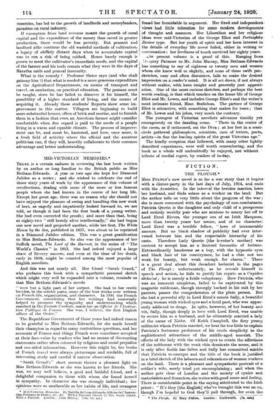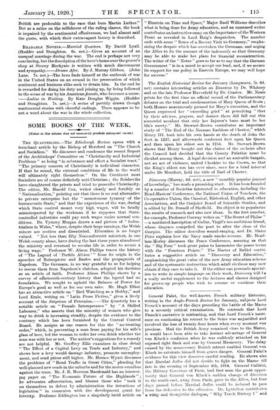FICTIO N . .
THE PLOUGH.*
Miss Finmon's new novel is so far a war story that it begins, with a, dinner-party in the last days of July, 1914, and ends with the Armistice. In the interval the heroine marries, loses her husband, and finds solace as a worker on the land. But the author tells-us very little about the progress of the war she is more concerned with the psychology of 'non-combatants. Patricia Qtterin is the daughter and only child of a prosperous • and entirely worldly pair who are anxious to marry her off, to Lord Errol Rivers, the younger son of an Irish Marquess, more than twenty years her senior; and of no character: Lard Errol was a terrible fellow, hero of innumerable amours. But no black shadow of publicity had ever inter- vened between him and the respectable hierarchy of his caste. Therefore Lady Querin [the heroine's mother] was content to accept him as: a; licensed favourite• of fortune: Extraordinarily handsome as a boy, with the hypnotic eyes' and black hair of his countrymen, he had a chin not too weak for beauty, but weak enough for charm." There is a great deal about this decadent- hedonist in the pages • of The Plough ; unfortunately, as he reveals himself in speech and action, he fails to justify his repute as a Cupiclon dichaine ; he is merely a futile voluptuary. How Patricia, who was an innocent simpleton, failed to be captivated by this magnetic nobleman, though strongly backed in his suit by her parents, passes the comprehension of the plain person. But she had a powerful ally in Lord Errol's cousin Sally, a beautiful young woman with wicked eyes and a lurid past, who was appar- ently addicted to drugs. In spite, however, of her beauty and wit, Sally, though deeply in love with Lord Errol, was unable to secure him as a• husband, and he ultimately married a lady' of the name of Niobe. Of Keith Campbell, the fiery young militarist whom Patricia married, we hear far too little to explain. Patricia's fortunate preference of his crude simplicity to the sophisticated attractions of the middle-aged amorist. The efforts of the lady with the wicked eyes to retain the affections of the nobleman with the weak chin dominate the scene, snd-it is only after Keith has fallen and Sally has committed suicide- that Patricia re-emerges and the title of the book is justified in a brief sketch of the labours and relaxations of women workers on the land. There is a pleasant and sympathetic portrait of a soldier's wife, sorely tried yet uncomplaining; and when tha author gets clear of London and the society of cynics and materialists and financiers, she writes with good sense and feeling. There is considerable point in the saying attributed to the Irish priest : " It's they [the English] who've brought this war on us,.. though I'm hopeful to God they'll pull through, for -even the • Ths Plough. By Mary.Fultoo. Leaden: Duckworth. [7s. =WI
British are preferable to the race that bore Martin Luther." But as a satire on the selfishness of the ruling classes, the book is impaired by the sentimental effusiveness, we had almost said the gusto, with which their extravagant luxury is described.



































 Previous page
Previous page